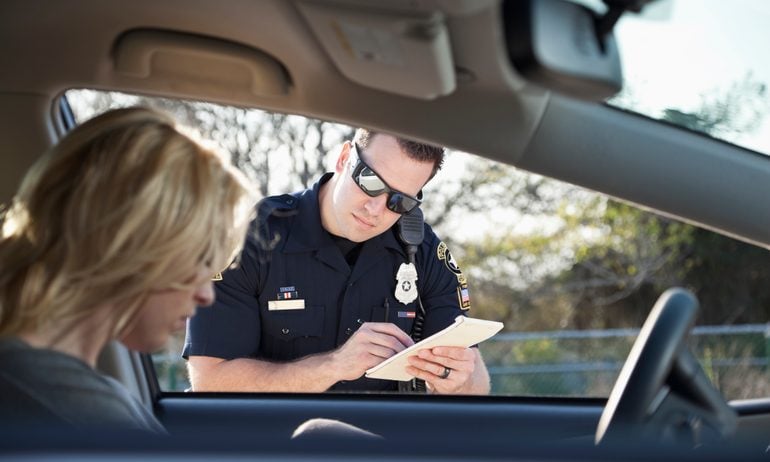What to Do When You Get a Speeding Ticket
Paying the ticket is easy, but your insurance rates will likely increase. It can be useful to know how to fight a speeding ticket or negotiate in court.

Many, or all, of the products featured on this page are from our advertising partners who compensate us when you take certain actions on our website or click to take an action on their website. However, this does not influence our evaluations. Our opinions are our own. Here is a list of our partners and here's how we make money.
There’s nothing fun about the feeling you get when those blue lights flash behind you on the highway. Nobody wants to get a speeding ticket, and for good reason. If you’re convicted, a violation will:
Affect your driving record, possibly resulting in suspension of your license.
Cost money upfront: You’ll pay the speeding ticket and any court fees.
Cost more money long term: After a ticket, your car insurance rates can rise by hundreds of dollars per year.
See what you could save on car insurance
Easily compare personalized rates to see how much switching car insurance could save you.
It’s possible to lessen the impact of a speeding ticket or erase it, though doing so may be difficult. Here’s how to fight a traffic ticket and avoid or limit its consequences.
On the day you’re pulled over
It’s likely you’re reading this because you’ve already gotten a speeding ticket, so file away these tips in case it happens again:
Ask which method the officer used to determine you were speeding and write it down afterward.
Say as little as possible. Anything you say can be used against you if you go to court.
Be polite, don’t argue, and try to be unremarkable. If the officer can’t remember you, he or she might fail to recall details in front of a judge if you plan on contesting a speeding ticket in court.
Afterward, write down everything about the incident, including the time of day, location and anything that might have affected the circumstances, such as obscured or missing speed limit signs.
You can choose to fight the speeding ticket in court, negotiate a lesser penalty or pay the speeding ticket and accept the ding to your driving record and the higher insurance premiums likely to result.
How to fight a speeding ticket in court
If you plan to fight the speeding ticket, you’ll have to go to court, where a prosecutor will have to prove you were speeding. Even if you think the ticket is unjustified, speeding violations are hard to beat.
If the officer doesn’t show up at the hearing, you could be off the hook, but don’t rely on that. If you ask for a hearing, plan to make your case and be questioned before a judge. Check the ticket to find out whether a state, county or local officer issued it and search online for traffic procedures in that jurisdiction. Look up your state’s motor vehicle code, carefully read the speed law you allegedly broke and prepare to argue that you didn’t.
As you prepare for court, you can:
Delay the hearing. If you have the option to reschedule, this will give you more time to build your case.
Gather evidence. Your best chances to win the argument will be if you have physical proof you weren’t speeding. Evidence could include dashcam video, GPS data from a smartphone app, or photographic evidence that a speed limit sign was obscured.
Research speed equipment. Look up the method the officer used to clock your speed, note its weaknesses and prepare to present them. Instruction manuals include maintenance schedules you can question the officer about, and they may note radar gun weaknesses, for example.
Ask witnesses to attend. You can call in witnesses, including any passengers in the car when the ticket was issued.
Plan your questions. You can question the issuing officer, including about his or her memory and training with speed-clocking equipment. Stick to questions with short answers and avoid asking “why” questions.
Deciding whether to get a lawyer
If all this sounds like more than you’d want to handle on your own, you can enlist a traffic lawyer to help you. These lawyers typically specialize in DUIs and more serious cases, but some take speeding ticket cases. Considering the costs, hiring a lawyer is likely worth the money if your ticket is particularly expensive or could result in the loss of your license.
A traffic lawyer can cost several hundred dollars, and a speeding ticket can cost anywhere from around $50 up to more than $2,000 for severe cases in some states.
See what you could save on car insurance
Easily compare personalized rates to see how much switching car insurance could save you.
If you decide to negotiate the speeding penalty
“Mitigation” is making a deal with the prosecutor and court; it saves the jurisdiction money by avoiding a hearing while lowering your penalty for the ticket. You may be able to request a negotiation before or at your hearing, but it’s the court’s decision, so check on the court’s website or call to be sure. In some areas, you must request mitigation in writing.
Typically in mitigation, you admit to the offense and present information that would lead a judge to grant you leniency. Outcomes may include:
You pay all or some of the ticket, but it doesn’t affect your driving record.
You take a driving course instead of paying the speeding ticket.
The ticket is reduced to a lesser fine.
You’re given extra time to pay the fine.
» MORE: Compare auto insurance rates
If you decide to pay the speeding ticket
Although paying a $100 ticket might not seem that bad, consider the true cost of a speeding ticket. Besides paying the initial fee, after a ticket, your car insurance rates can rise by hundreds of dollars per year.
For instance, NerdWallet’s February 2026 rate analysis found that:
A 35-year-old driver with good credit and full coverage will pay $650 more per year after one speeding ticket, on average.
On average, a 35-year-old driver with good credit and minimum coverage will pay $177 more per year with one speeding ticket on their record.
These higher rates would persist for several years after the speeding ticket was issued.
If you do end up accepting the speeding ticket, it’s crucial to compare car insurance rates; some companies will raise your rates more than others.
For example, based on our analysis of some of the nation’s largest insurers, State Farm is the company that raised median annual rates the least for drivers with a recent speeding ticket, compared to its median rates for drivers without a speeding ticket on their record.
Other possible outcomes after getting a speeding ticket
There are other possible ways your speeding ticket can shake out. For example, depending on where you live:
Your state may waive your first moving violation if you take a driving course.
You could receive a deferral, in which case typically you’ll pay a fine and your ticket will be dismissed after a period of time if there are no further offenses.
Whatever you do, don’t ignore the speeding ticket. It won’t just go away on its own, and you’ll be in much bigger trouble with the law. How much trouble depends on your state: You could have to pay larger fines, your license could be suspended, or you could even be arrested.
NerdWallet averaged rates based on public filings obtained by pricing analytics company Quadrant Information Services. We examined rates for men and women for all ZIP codes in any of the 50 states and Washington, D.C. Although it’s one of the largest insurers in the country, Liberty Mutual is not included in our rates analysis due to a lack of publicly available information.
In our analysis, “good drivers” had no moving violations on record; a “good driving” discount was included for this profile. Our “good” and “poor” credit rates are based on credit score approximations and do not account for proprietary scoring criteria used by insurance providers.
These are average rates, and your rate will vary based on your personal details, state and insurance provider.
Sample drivers had the following coverage limits:
$100,000 bodily injury liability coverage per person.
$300,000 bodily injury liability coverage per crash.
$50,000 property damage liability coverage per crash.
$100,000 uninsured motorist bodily injury coverage per person.
$300,000 uninsured motorist bodily injury coverage per crash.
Collision coverage with $1,000 deductible.
Comprehensive coverage with $1,000 deductible.
In states where required, minimum additional coverages were added. We used the same assumptions for all other driver profiles, with the following exceptions:
For drivers with a ticket, we added a single speeding violation for driving 16 mph over the speed limit.
For drivers with minimum coverage, we adjusted the numbers above to reflect only the minimum coverage required by law in the state.
We changed the credit tier from “good” to “poor” as reported to the insurer to see rates for drivers with poor credit. In states where credit isn’t taken into account, we only used rates for “good credit.”
We used a 2021 Toyota Camry LE in all cases and assumed 12,000 annual miles driven. We analyzed rates for the following ages: 20, 30, 35, 40, 50, 60 and 70. However, only rates for drivers aged 35 were used in these comparisons.
These are rates generated through Quadrant Information Services. Your own rates will be different.




